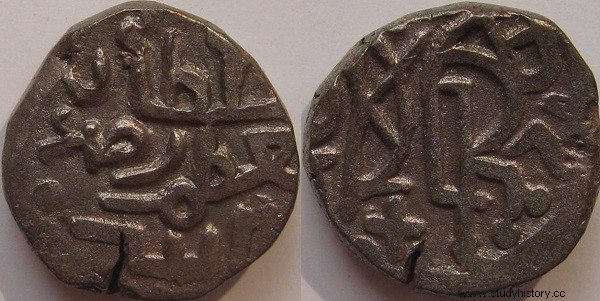Jalâlat ud-Dîn Raziya, known as Razia al-Din or Sultan Razia (1205 – 1240) is the only woman to have reigned over Delhi, after her father chose her as heir to the throne at the expense of her brothers.
Designated heiress in place of her brothers
 Of Turkish descent, Razia al-Din was born in 1205 in Badaun (northern India, Delhi) and learns, like other Muslim princesses, to handle arms and administer a kingdom. Her father, Shams ud-Dîn Îltutmish, Sultan of Delhi, designates her as heiress, judging that his sons are too preoccupied with their own pleasures to make good rulers. But when he died in 1236, the nobility refused to see a woman occupy the throne and his brother Rukn ud-Dîn Fîrûz Shâh came to power in his place. The new sultan gives himself up to the pursuit of personal pleasures, and it is his mother, Shah Turkaan, who pulls the strings.
Of Turkish descent, Razia al-Din was born in 1205 in Badaun (northern India, Delhi) and learns, like other Muslim princesses, to handle arms and administer a kingdom. Her father, Shams ud-Dîn Îltutmish, Sultan of Delhi, designates her as heiress, judging that his sons are too preoccupied with their own pleasures to make good rulers. But when he died in 1236, the nobility refused to see a woman occupy the throne and his brother Rukn ud-Dîn Fîrûz Shâh came to power in his place. The new sultan gives himself up to the pursuit of personal pleasures, and it is his mother, Shah Turkaan, who pulls the strings.
Sultan Raziya
The situation and the attitude of the sultan strongly displease the people. Less than seven months later, Razia al-Din defeated his brother* and regained his throne, with the support of the people and despite the reluctance of the nobility. Refusing to be called "sultana", a term designating the sultan's wife, she called herself Sultan Razia. Experienced in state affairs in which she was interested before the death of her father, she restores peace in the country. Abandoning the veil, she adopts men's clothes and carries a sword at her side. It built roads, founded schools and libraries, and supported commerce and culture. Her leadership skills are praised and recognized.
To assist her in power, Razia made Jalal-ud-din Yaqut, an Abbyssinian slave, her personal assistant and lover or confidant. This relationship stirs the anger of Turkish governors and nobles. One of her childhood friends, Altûnya, the governor of Bhatinda, joins a rebellion against her. During a battle between the two factions, Yaqut is killed and Razia captured. To save her life, she agrees to marry Altûnya, but her brother Muizz ud-Dîn Bahrâm Shâh usurps power. Razia and her husband attempt to reclaim the throne but, defeated in battle, they are forced to flee and abandoned by their men. On October 13, 1240, Razia al-Din was assassinated by a peasant who offered him hospitality
*According to sources:Ruknuddin is killed in battle, he is executed after a trial or he and his mother are murdered.
